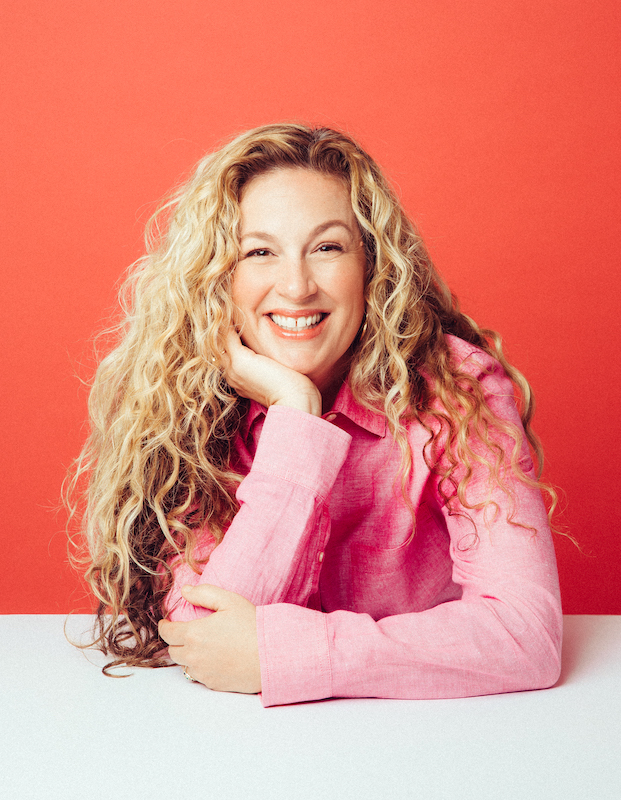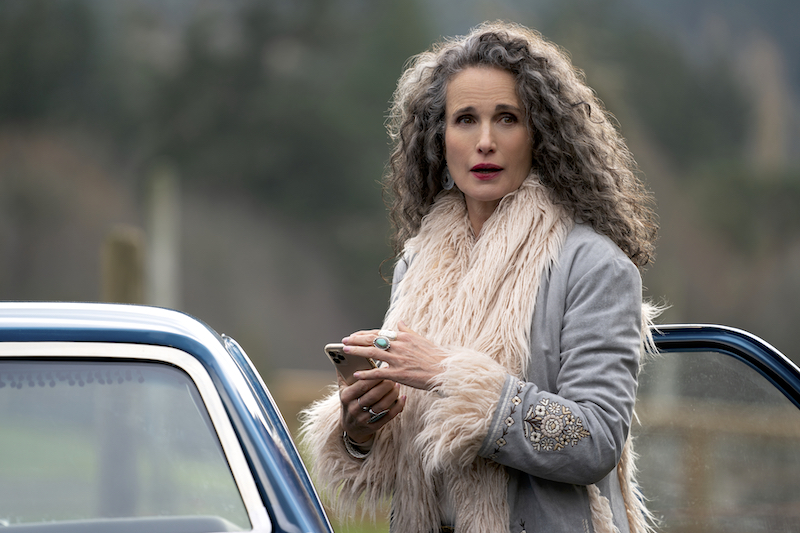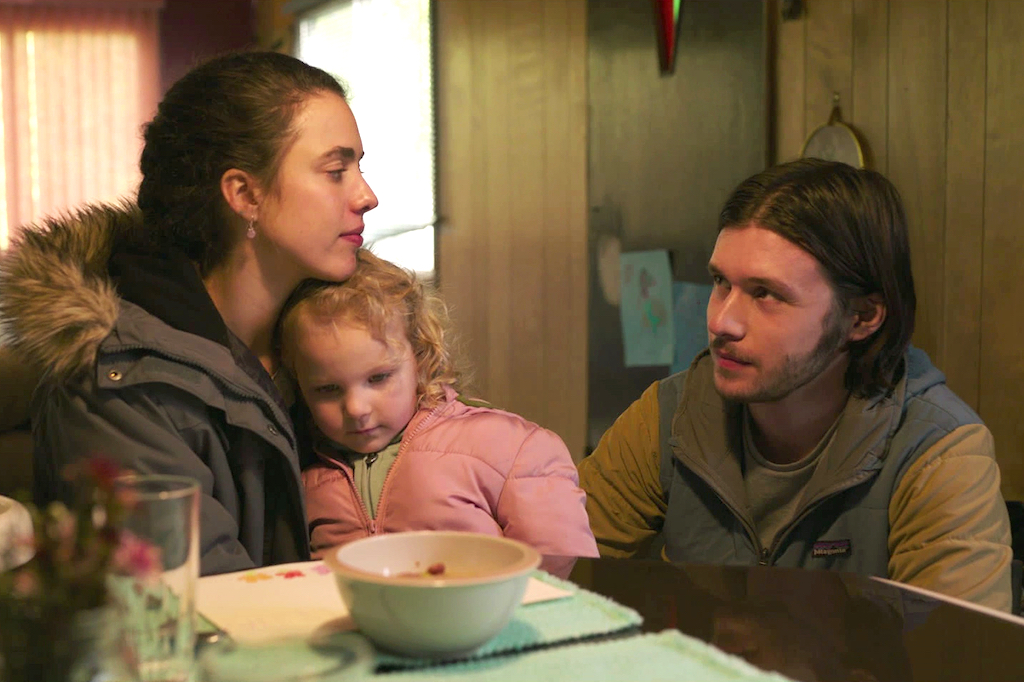There are mild spoilers in this interview.
Stephanie Land’s groundbreaking New York Times best-selling memoir Maid: Hard Work, Low Pay, and a Mother’s Will to Survive was the impetus for Maid, the 10-part series with the abridged title of Maid. Both take an uncomfortable look at the insidious nature of domestic violence and systemic poverty in America. Showrunner, Molly Smith Metzler spoke with Creative Screenwriting Magazine about transforming the story of Alex (Margaret Qualley), a young mother fleeing an abusive relationship with her young daughter to the screen. “It’s a show about the fight.”
“The TV series was a loose adaptation of Land’s memoir,” said the writer. Despite the sharp departure from the book, Maid, the TV series still captures the core of the story of Alex leaving a relationship and becoming a housekeeper. She struggles to support herself and two year old daughter Maddy (Rylea Nevaeh Whittet) on a series of tenuous minimum wage cleaning jobs. “She’s very lonely and struggles to navigate the social safety net.” Alex is a fictional character, but her experiences are reflective of real life.
Alex is very alone in the houses that she cleans which form the basis of her writing that eventually get her into college. We don’t always meet the owners of these houses, which allows Alex to meditate and imagine the possible lives of the occupants.

Molly Smith Metzler
Molly Smith Metzler fell in love with Land’s memoir several years ago and had a clear idea of how she wanted Alex’s story portrayed on the screen. Rather than opting for the physically brutal images we often associate with domestic violence, she focused on the brutal effects of emotional abuse. She is acutely aware of the didactic turn many cause films and television series might take. “Nobody wants to sit through a lecture and made to feel schooled,” she cautioned.
Spotlight On Emotional Abuse
Determined not to push the domestic violence to the sidelines, the showrunner told a sideways emotional account of Alex’s experiences and “sneaked in the ’cause.‘” If the show became too earnest and worthy, the audiences may shut down.
Smith Metzler chose a 10-episode format so the audience can fully experience Alex’s emotional abuse in real time. “Emotional abuse is as violent as physical abuse. It’s a corrosive, slow-burn.” Molly made the decision early on that Sean (Nick Robinson), Alex’s ex-partner and Maddy’s father, was never going to physically hurt Alex or Maddy.
Alex never thought she was being abused
In order to really make the point, Alex was in a state of denial in the early episodes because she only considered abuse as physical. Furthermore, Sean adores Maddy.
The research process was understandably comprehensive. Molly Smith Metzler was present at the intake sessions at certain shelters with the survivors and their children. She also went through the entire intake in the same way as any victim for the immersive experience.
She also consulted many external groups and associations to ensure she wrote an authentic survivor experience in Maid. It was during these sessions where the writer was shocked at how many survivors didn’t consider emotional abuse to be ‘real’ abuse. Instead, they rationalized their partners’ behaviors as “being mean”,”having a bad day,” or “under a lot of stress.” The most eye-opening aspect of domestic abuse is that takes an average of seven times to permanently leave an abusive relationship. “I saw that statistic in person.”
The other key features of domestic abuse is the loneliness and helplessness of the victims. “In one episode, Alex sank into the couch and can’t hear someone knocking on the door who wants to help her because she’s too far away and beaten down emotionally.”
Alex’s character was carefully layered so she was neither an explicit victim nor a heroine. Becoming a mother made Alex more aware of her circumstance and the urgency to remedy it. During a group therapy session, she confessed, “I don’t know how I got here. I don’t know what happened to me.” All she knew was that she had to break the abusive cycle for both their sakes.
Alex is by no means a perfect person trying to figure things out. She makes many poor decisions that adversely affect both her and Maddy.
Sean is a recovering alcoholic working in a bar and struggles to make amends with them. He carries his own childhood trauma which he struggles to free himself from. Rather than wanting the audience to Sean as the abuser, Molly Smith Metzler prefers they feel empathy for him. She wants to feel empathy for all the characters rather than judge them. Sean’s trying his best to dig himself out of his hole. Alex and Maddy are the reason he quit drinking. He’s his own worst enemy. “Change is difficult, but not impossible.” The showrunner wants the audience to root for Sean too.
Nobody is exclusively a hero or villain in real life. Everyone is a shade of gray.
As a counter to the emotional abuse, Hank (Billy Burke), Alex’s father did hit Paula (Andie MacDowell), Alex’s mother when she was a girl, causing her to leave the family home with Alex. Hank doesn’t remember any of this. Hank is also a recovering alcoholic and tries to reconcile with Alex. He’s still distance from Paula.
“Hank is delicately sober and very committed to gaslighting his narrative about who he is.” He strongly encourages Sean to attend AA meetings with him. It’s unclear whether Hank has blocked out his memories due to alcohol abuse, or he chose to forget. “The correct answer doesn’t matter. It’s his truth that matters.” Maid carefully understates these elements of Hank’s character.

Paula (Andie MacDowell). Photo courtesy of Ricardo Hubbs/ Netflix
Paula, Alex’s mother, is a flakey artist who relies on her “good weed” and a steady stream of men to get by. Unlike Alex, Paula is a lost soul, unlikely to find her footing any time soon.
Paula is simultaneously both a good parent and grandparent and a bad one. “Her narcissism is deplorable. She is also a victim of her own bad choices and psychological abuse.” Despite rarely doing right by Alex and Maddy, she loves them both in her own way. But she doesn’t really know how to love them. “Paula can’t be there for Alex, but can paint a mural in Maddy’s room.”
Maddy is constantly shuffled between Alex, Paula, Sean, and Hank. She appears to be well-adjusted with the situation, but it’s unclear how she’ll turn out as she matures. The showrunner wanted the show to end on a hopeful note when Maddy and Alex go to Missoula. “Maddy’s not going to have the same traumatic memories that Alex had and that’s a real victory for both of them.”
A Subtle Tone
A television show about domestic violence often lends itself to ‘shouty’ soap operas. Maid took a different route, opting for a soft, muted, meditative approach to its storytelling. There were few raised voices or scenes of acts of violence in the show.
This approach is a consequence of Molly’s background as a playwright. “The TV writers’ room was naturally staffed with playwrights. We told Alex’s story with humility. We claimed Alex’s space to investigate her dimensions.”
Alex manages to extricate herself from her situation by eventually going to college. Her fate in Missoula is unclear because she must still clean houses and apply for government grants to survive. Ideally, she’ll find some peace, solace, happiness, and stability in her life. “It’s gonna be a hard road putting herself through college as a single mom. She’ll find happiness on her own terms.”
Class and social economics are defining themes that are evident in much of Molly Smith Metzler’s work. “I’m also drawn to stories about motherhood and generational trauma. They must have pathos and humor. I love to write in the space were comedy and drama dance together.” This is reflected in both her play and TV writing.
Molly has also written for Casual and Orange Is The New Black which are effectively comedies, but have a lot of drama in them. “I also like to do ‘surprising’ and upend expectations.”
